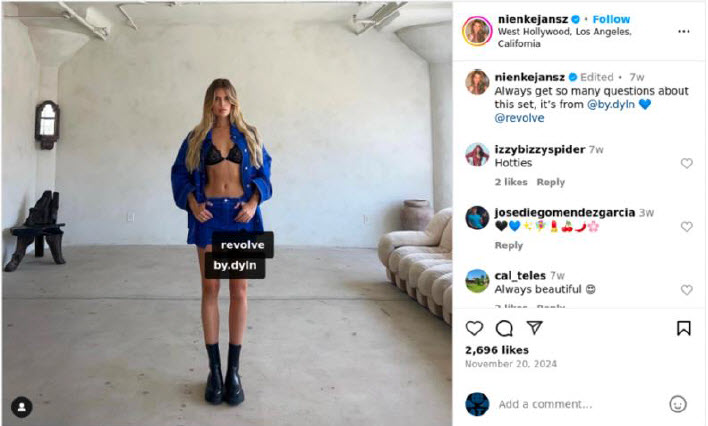
Influencers and Retailer Sued for Alleged Disclosure Violations
Although the FTC has not recently announced any new endorsement disclosure cases, a consumer has taken up the issue by filing a class action lawsuit in California.
On April 11, 2025, Ligia Negreanu filed suit against Revolve Group (an apparel brand) along with three influencers, Cindy Mello, Tika Camaj, and Nienke Jansz.
Factual Background
The consumer alleged that Revolve has been using “thousands of social media influencers” to market its products in a “cost-effective” way to benefit the company while misleading customers. None of the allegedly misleading posts were marked in any way as being sponsored or advertising. The consumer argued that the class of purchasers would not have purchased the items at the price they paid if they had known that the influencers were being compensated for their posts rather than giving their “honest opinion.”
An example of the posts relied upon by the consumer showed an influencer wearing an outfit and posting “Always get so many questions about this set, it’s from @by.dyln @revolve” and tagging Revolve in the image. The post had no advertising disclosure or indication of whether the product was gifted or the influencer was being compensated by Revolve in any way.

Was the Lack of Disclosure Intentional?
The consumer alleged that both Revolve AND the influencers knew that the endorsements were supposed to be disclosed but willingly chose not to. As for the influencers, the consumer pointed to other sponsored posts on the influencers’ Instagram feeds that show them using the built-in “Partnership” capabilities of the platform or the inclusion of “#ad” in the posts.
As for Revolve, the consumer provided statements from Revolve’s 2023 Annual Report indicating that it knew about the FTC disclosure requirements. In fact, the report stated: “[I]n some cases, the Federal Trade Commission, or the FTC, has sought enforcement action where an endorsement has failed to clearly and conspicuously disclose a financial relationship or material connection between an influencer and an advertiser. We do not prescribe what our influencers post and if we were held responsible for the content of their posts or their actions, we could be fined or forced to alter our practices, which could have an adverse impact on our business.”
Things get even more complicated as the consumer alleged that Revolve was selling similar products under a different brand name at considerably less cost, and influencers for the cheaper brand DID properly disclose endorsements. The customer argued that Revolve was intentionally trying to hide the fact of the endorsements to be able to sell the Revolve products for higher prices.
What is the Law?
The consumer alleged “deceptive, unfair and misleading promotion of products” by Revolve and the influencers. In addition to the FTC Act (which is where we generally talk about these types of disclosure violations and was included as an “element” of the other causes of action), the consumer alleged violations of state laws such as the Florida Deceptive Trade Practices Act, the California Unfair Competition Law, and the California False Advertising Law. Also included were “consumer protection statutes” in 24 other states and D.C.
Taking all of the various laws together, the consumer asked for various remedies including “compensatory, punitive, and treble damages in excess of $50,000,000” to be awarded to the class of consumers harmed.
What Next?
A complaint like this includes all of the facts taken from one side without response yet from the other side. At this point, there is no proof that 1) the influencers WERE compensated for their posts, or 2) the lack of disclosure was done intentionally. Once Revolve and the influencers have a chance to respond to the case, we will better be able to discuss what actually happened and potential outcomes.
However, the case does serve as a reminder of a few things:
- Even if the FTC is not taking action on endorsements, consumers can.
- All parties to the partnership can be sued.
- State laws can be used in endorsement lawsuits and those state laws can vary from the federal law the FTC Endorsement Guidelines are based on.
Be sure to sign up for the PMA Newsletter so you don’t miss any influencer or partnership news!
Latest posts by Tricia Meyer (see all)
- Webinar Replay: Rewarding Publisher Influence in LLMs - January 28, 2026
- New Whitepaper: Beyond the Affiliate Coupon Code - January 26, 2026
- New Webinar: Rewarding Publisher Influence in LLMs - January 8, 2026

 Follow
Follow